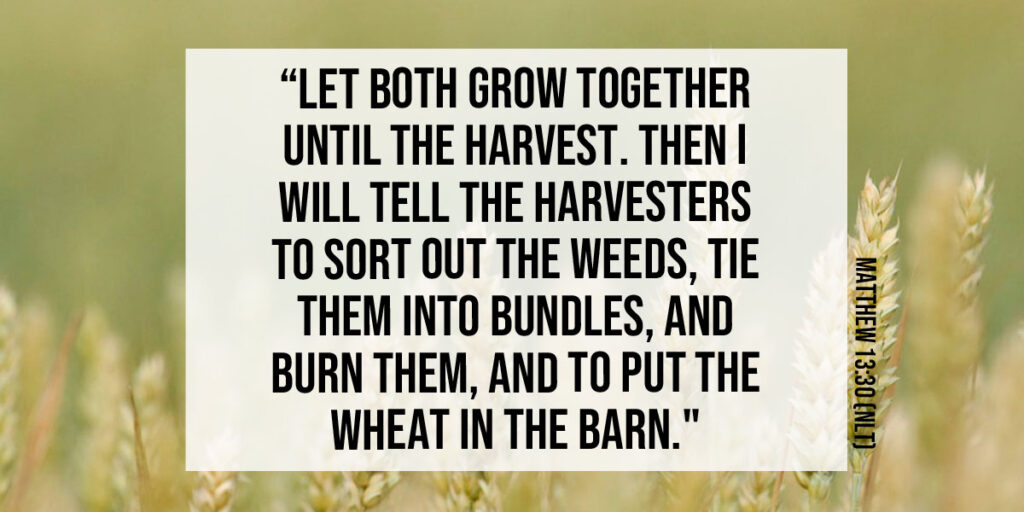
When we dive into the Scriptures, we often uncover powerful connections that deepen our understanding of God’s truth. One compelling parallel is found between Matthew 13:24-30 and Revelation 14:14-20. In both passages, our powerful Lord uses vivid agricultural imagery to convey not only God’s judgment, but also the harvest, and the final separation of the righteous from the unrighteous. These passages reveal God’s plans for the end times and the ultimate fulfillment of His justice.
The Parable of the Weeds (Matthew 13:24-30)
In Matthew 13, Jesus teaches us through a parable of the weeds among the wheat. A farmer sows good seeds in his field, but while he sleeps, an enemy comes and sows weeds among the wheat. When the plants begin to grow, the weeds become apparent. The farmer’s servants ask if they should pull up the weeds, but the farmer advises against it. He says in Matthew 13:30 (NLT), “Let both grow together until the harvest. Then I will tell the harvesters to sort out the weeds, tie them into bundles, and burn them and to put the wheat in the barn.”
Those of us that have accepted Jesus Christ as our personal Lord and Savior are the harvest. Our sojourn on earth has afforded us with the opportunity to remember who we were created to be, and to choose Jesus. God has given us this remarkable gift of life on earth, but He will not force us to love and honor Him; it’s completely our choice. Our Heavenly Father is allowing us the benefit of time because He doesn’t want any whose name is written in His Book of Life to perish. 2Peter 3:9 (NLT) tells us, “The Lord isn’t really being slow about his promise, as some people think. No, he is being patient for your sake. He does not want anyone to be destroyed, but wants everyone to repent.”
As those that are part of God’s Kingdom, we have the privilege to look to Jesus, who made it possible for us to be saved and filled with the Holy Spirit. It’s important for us to remember that like us, our Lord and Savior, Jesus Christ, had free will when he walked upon this earth. God would not grant free will to all of us without also granting it to His only begotten Son. At any moment, Jesus could have chosen to act contrary to the Will of God, but he never did. He willingly forfeited his own will to fulfill the Will of the Father. As he said in John 6:38 (NLT), “For I have come down from heaven to do the will of God who sent me, not to do my own will.”
Our Lord and Master never did anything wrong, and this is one of the reasons our hearts burn for him. He’s glorious in every way. In John 8:29 (NLT), he said, “And the one who sent me is with me—he has not deserted me. For I always do what pleases him.” This profound dedication to pleasing God is a testament to his character and a model for us to follow.
Jesus’ compassion, kindness, and love defy any word in human vocabulary, transcending our attempts to fully capture the beauty of his personhood. Jesus demonstrated an extraordinary ability to empathize with the suffering and brokenness of those around him. He healed the sick, fed the hungry, and welcomed the outcast, showing a depth of care and love that knows no bounds. Yet, despite his profound goodness, he was met with mockery, persecution, and relentless opposition. He endured lies and false accusations, facing threats on numerous occasions, including plots against his life.
It’s wild to think about: here’s the precious Lamb of God, sent to save humanity, and yet many of the very people he came for turned their backs on him. As John 1:11 (NLT) puts it, “He came to his own people, and even they rejected him.” It’s heartbreaking to see this, but it showcases the tragic reality of human sin and the hardness of the heart.
Fast forward to today, and it feels like evil and darkness have only grown. There’s no denying that there’s still good in the world—acts of kindness, love, and hope—but it’s hard to overlook the fact that we seem to be living in a time when the presence of evil is so blatantly obvious. From injustice and hatred to division and despair, it feels like the darkness is all around us. As those who are the harvest, we can be comforted in our salvation and the love Christ has for us.
In his parable in Matthew 13, the farmer represents God, who allows both the righteous (the wheat) and the wicked (the weeds) to exist until the end of the age. It’s a reminder that the final judgment is in God’s hands, and He will ultimately separate the two. God’s plan for the universe is coming together, and we should be greatly comforted by this because evil will not win.
The Harvest of the Earth (Revelation 14:14-20)
In Revelation 14:14-20, through John, our Lord and Savior shares end time prophecy with us. This imagery of harvest and judgment echoes the parable in Matthew 13. The emphasis here is on the finality of God’s judgment. Just as the farmer in the parable decides when to gather the wheat and the weeds, God will determine the right time to gather the righteous and judge the wicked.
John describes a vision of a white cloud and the Son of Man, holding a sickle as he prepares to reap the harvest of the earth. This is packed with meaning. When the angel shouted, “Swing the sickle,” it signifies that the time has come for God’s judgment. A sickle is a farming tool with a curved blade, traditionally used for cutting grain or harvesting crops. It symbolizes the act of reaping—a crucial part of agricultural life that signifies the gathering of a harvest. Revelation 14:17-19 (NLT) tells us, “After that, another angel came from the Temple in heaven, and he also had a sharp sickle. Then another angel, who had power to destroy with fire, came from the altar. He shouted to the angel with the sickle, ‘Swing the sickle now to gather the clusters of grapes from the vines of the earth, for they are ripe for judgment.’”
Both of these passages hit hard on the truth that God’s judgment is real and coming. They remind us that even when it feels like evil is winning, that’s not the whole story; it will not last forever. In Matthew, the weeds are left until the harvest, symbolizing God’s patience and mercy. In Revelation, when it talks about gathering, it’s all about wrapping up His plan for justice.
Yet, there’s also a message of hope woven into this. For believers, the harvest represents the fulfillment of God’s promises. Just as the wheat is gathered into the barn, we can be confident in our place in God’s kingdom. Revelation gives us a vivid picture of this ultimate hope, where God’s justice and mercy beautifully meet. ■
Scripture quotations marked (NLT) are taken from the Holy Bible, New Living Translation, copyright © 1996. Used by permission of Tyndale House Publishers, Inc., Wheaton, Illinois 60189. All rights reserved.
“Harvest Time: The Parallels Between Matthew 13 and Revelation 14”, written for Springfield Fellowship © 2024. All rights reserved. All praise and honor to God through Jesus Christ, our Lord and Savior.

